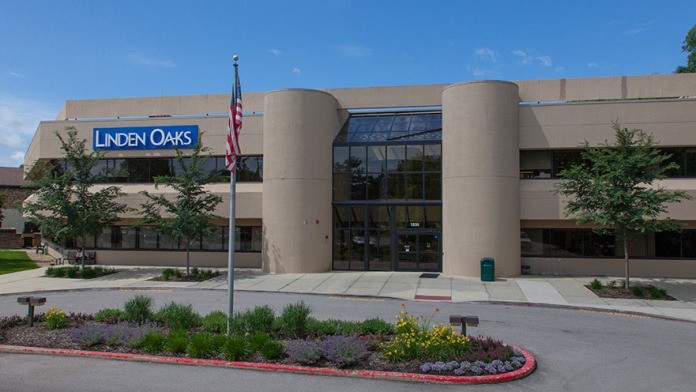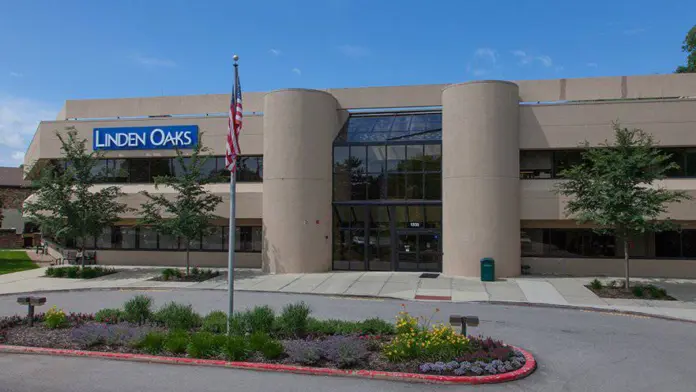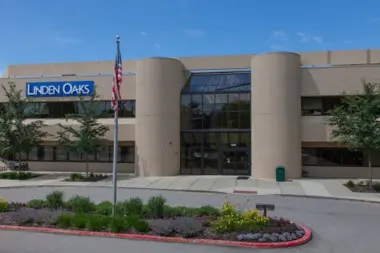We had our apartment damaged during the Woodridge tornado of 2020 leaving us homeless. Ultimately I turned to Linden Oaks' outpatient program to help with my anxiety, PTSD, and depression. It was not an easy program and requires hard work on your part to feel like the pro ...
About Linden Oaks Behavioral Health Outpatient Center – Naperville
In the intensive outpatient program (IOP), clients are expected to get treatment 3 to 3.5 hours daily, five days a week. In more severe cases, staff may recommend clients participate in the partial hospitalization program (PHP), which requires clients to go to the facility five days a week for 5 to 6 hours a day. The services in these programs include individual therapy, skill development and medication management. I like that Linden Oaks puts equal emphasis on the importance of individualized care and group therapy. They follow evidence based treatment models when conducting group therapy.
Patients are in a supportive environment to apply their learned therapeutic skills and reduce any risk of relapse. For individual care, clients will receive family therapy, individual therapy and any other specialized services as needed. Linden Oaks wants to help address areas that can contribute to substance use, such as OCD, trauma and chronic pain. In counseling, clients will learn how to develop healthy coping skills from state licensed staff members to become better able to manage mental health and behavioral challenges.
Latest Reviews
Rehab Score
Gallery




Accepted Insurance
Other Forms of Payment
Medicaid is a state based program that helps lower-income individuals and families pay for healthcare. Medicaid covers addiction treatment so those enrolled can use their coverage to pay for rehab. When a program accepts Medicaid the client often pays very little or nothing out of their own pocket.
Private insurance refers to any kind of healthcare coverage that isn't from the state or federal government. This includes individual and family plans offered by an employer or purchased from the Insurance Marketplace. Every plan will have different requirements and out of pocket costs so be sure to get the full details before you start treatment.
Self-pay involves paying for treatment out of your own pocket. You can use savings or credit, get a personal loan, or receive help from family and friends to fund your treatment. If you don't have insurance or your insurance plan doesn't cover a specific program, self-pay can help ensure you still get the care you need.
Financial aid can take many forms. Centers may have grants or scholarships available to clients who meet eligibility requirements. Programs that receive SAMHSA grants may have financial aid available for those who need treatment as well. Grants and scholarships can help you pai for treatment without having to repay.
Military members, veterans, and eligible dependents have access to specific insurance programs that help them get the care they need. TRICARE and VA insurance can help you access low cost or no cost addiction and mental health treatment. Programs that accept military insurance often have targeted treatment focused on the unique challenges military members, veterans, and their families face.
Medicare is a federal program that provides health insurance for those 65 and older. It also serves people under 65 with chronic and disabling health challenges. To use Medicare for addiction treatment you need to find a program that accepts Medicare and is in network with your plan. Out of pocket costs and preauthorization requirements vary, so always check with your provider.
Addiction Treatments
Levels of Care
Outpatient care for addiction is an important part of the recovery process. After the initial detoxification and/or residential treatment, they will work with you to set up an outpatient treatment plan that meets your needs. There are different levels available depending on the patient's needs, including the Partial Hospitalization Program and the Intensive Outpatient Program.
Drug and alcohol addiction often takes a heavy toll on one’s body. Over time, a physical dependence can develop, meaning the body physiologically needs the substance to function. Detox is the process of removing drugs and/or alcohol from the body, a process that can be lethal if mismanaged. Medical detox is done by licensed medical professionals who monitor vital signs and keep you safe, healthy, and as comfortable as possible as you go through detox and withdrawal. Linden Oak's Addiction Services unit is a separate area within Linden Oaks Hospital that offers treatment for those undergoing withdrawal as they stop the cycle of addiction. Patients are detoxified under the care of a psychiatrist, and their staff has specialized training to provide the medication, monitoring and support needed during the withdrawal process.
Intensive Outpatient programs are for those who want or need a very structured treatment program but who also wish to live at home and continue with certain responsibilities (such as work or school). IOP substance abuse treatment programs vary in duration and intensity, and certain outpatient rehab centers will offer individualized treatment programs. At Linden Oaks the IOP consists of daily therapy, including group, individual and family.
Residential treatment programs are those that offer housing and meals in addition to substance abuse treatment. Rehab facilities that offer residential treatment allow patients to focus solely on recovery, in an environment totally separate from their lives. Some rehab centers specialize in short-term residential treatment (a few days to a week or two), while others solely provide treatment on a long-term basis (several weeks to months). Some offer both, and tailor treatment to the patient's individual requirements. Linden Oaks' Residential Stay Program offers additional support for those who may benefit from a structured living environment. A patient's stay may vary from a few days to 30 days ago. The program includes group, family and individual counseling.
Intervention services helps family or friends of addicts stage an intervention, which is a meeting in which loved ones share their concerns and attempt to get an addict into treatment. Professional intervention specialists can help loved ones organize, gather, and communicate with an addict. They can guide intervention participants in describing the damage the addict's behavior is causing and that outside help is necessary to address the addiction. The ideal outcome of an intervention is for the addict to go to rehab and get the help they need.
12-step programs are addiction recovery models based on Alcoholics Anonymous (AA). A number of substance abuse programs (including some drug and alcohol rehab centers) use the 12 steps as a basis for treatment. Beginning steps involve admitting powerlessness over the addiction and creating a spiritual basis for recovery. Middle steps including making direct amends to those who've been hurt by the addiction, and the final step is to assist others in addiction recovery in the same way. 12-Step offshoots including Narcotics Anonymous (NA), Cocaine Anonymous (CA), Dual Recovery Anonymous (DRA), Sex and Love Addicts Anonymous (SLAA) and Gamblers Anonymous (GA).
As part of the ongoing care, they highly recommend support groups. They provide a place for patients to share their story and offer strategies to cope with life’s struggles. They offer access to a wide variety of support groups including: Al-Anon, Alcoholics Anonymous, Cocaine Anonymous, Nar-Anon, Narcotics Anonymous, and Positive Acceptance Towards Healing (PATH) for family members and friends of addicts.
As a flexible option, a partial hospitalization program (PHP) is tailored for those who don't require 24-hour care. PHP treatment can include daily therapeutic sessions and services such as relapse prevention and medication management. Based on your needs, PHP treatment duration can average 90 days and require a minimum of 20 hours of commitment weekly. While a partial hospitalization program typically requires a commute, telehealth may be available. PHP treatment costs can vary but are often covered by most insurance.
Treatments
The goal of treatment for alcoholism is abstinence. Those with poor social support, poor motivation, or psychiatric disorders tend to relapse within a few years of treatment. For these people, success is measured by longer periods of abstinence, reduced use of alcohol, better health, and improved social functioning. Recovery and Maintenance are usually based on 12 step programs and AA meetings.
Drug rehab in Illinois is designed to help people recover from addiction to a number of substances. The length of each program and its intensity tend to vary, and the plan of care is based on your individual needs.
They realize addiction is a progressive disorder, and that people often experience addiction with one or more mental health issues—something they refer to and treat as a dual diagnosis. It is common for an individual with an addiction to be struggling with depression, anxiety or another mental health disorder. The addiction may be the result of trying to feel calmer or cope with depression or anxiety. If the substance abuse has become severe enough, it could lead to a personality disorder, mood disorder or other behavioral problems. They look for this and treat the disorder along with the addiction for the best possible outcome.
A combined mental health and substance abuse rehab has the staff and resources available to handle individuals with both mental health and substance abuse issues. It can be challenging to determine where a specific symptom stems from (a mental health issue or an issue related to substance abuse), so mental health and substance abuse professionals are helpful in detangling symptoms and keeping treatment on track.
Opioid rehabs specialize in supporting those recovering from opioid addiction. They treat those suffering from addiction to illegal opioids like heroin, as well as prescription drugs like oxycodone. These centers typically combine both physical as well as mental and emotional support to help stop addiction. Physical support often includes medical detox and subsequent medical support (including medication), and mental support includes in-depth therapy to address the underlying causes of addiction.
Programs
Adult rehab programs include therapies tailored to each client's specific needs, goals, and recovery progress. They are tailored to the specific challenges adult clients may face, including family and work pressures and commitments. From inpatient and residential treatment to various levels of outpatient services, there are many options available. Some facilities also help adults work through co-occurring conditions, like anxiety, that can accompany addiction.
Young adulthood can be an exciting, yet difficult, time of transition. Individuals in their late teens to mid-20s face unique stressors related to school, jobs, families, and social circles, which can lead to a rise in substance use. Rehab centers with dedicated young adult programs will include activities and amenities that cater to this age group, with an emphasis on specialized counseling, peer socialization, and ongoing aftercare.
Clinical Services
Cognitive Behavioral Therapy (CBT) is a therapy modality that focuses on the relationship between one's thoughts, feelings, and behaviors. It is used to establish and allow for healthy responses to thoughts and feelings (instead of unhealthy responses, like using drugs or alcohol). CBT has been proven effective for recovering addicts of all kinds, and is used to strengthen a patient's own self-awareness and ability to self-regulate. CBT allows individuals to monitor their own emotional state, become more adept at communicating with others, and manage stress without needing to engage in substance abuse.
Dialectical Behavior Therapy (DBT) is a modified form of Cognitive Behavioral Therapy (CBT), a treatment designed to help people understand and ultimately affect the relationship between their thoughts, feelings, and behaviors. DBT is often used for individuals who struggle with self-harm behaviors, such as self-mutilation (cutting) and suicidal thoughts, urges, or attempts. It has been proven clinically effective for those who struggle with out-of-control emotions and mental health illnesses like Borderline Personality Disorder.
Linden Oaks Behavioral Health is known throughout the Chicago area for its comprehensive eating disorders program. Led by a team of experienced psychiatrists who specialize in eating disorders, they offer the latest techniques to help adults and adolescents age 13 and older who are struggling with anorexia, bulimia and related eating disorders. Their program offers inpatient, partial hospitalization and intensive outpatient care. Through group therapy, nutrition education and exercise counseling, they help individuals address complex psychological issues while treating physical and dietary needs.
Therapists use everyday activities (occupations) to help people recovering from illness, injury and/or addiction regain and improve the skills they need to thrive in their daily lives. Groups focus on career-related topics that include: identifying interests and job skills, building a resume, preparing for job interviews, finding a job and exploring careers, and maintaining employment.
Research clearly demonstrates that recovery is far more successful and sustainable when loved ones like family members participate in rehab and substance abuse treatment. Genetic factors may be at play when it comes to drug and alcohol addiction, as well as mental health issues. Family dynamics often play a critical role in addiction triggers, and if properly educated, family members can be a strong source of support when it comes to rehabilitation.
Group therapy is any therapeutic work that happens in a group (not one-on-one). There are a number of different group therapy modalities, including support groups, experiential therapy, psycho-education, and more. Group therapy involves treatment as well as processing interaction between group members.
The therapists of Linden Oaks Medical Group provide traditional outpatient therapy. Patients usually meet once or twice a week for talk therapy with a counselor. The frequency of your sessions may vary based on your therapist’s and/or psychiatrist’s recommendations. Sessions last 45 minutes to an hour.
In addition to intensive outpatient programs (half day) and partial hospitalization programs (full day), they also offer life skills education. Their life skills education is designed to provide vocational training and teach you healthy coping and problem-solving skills.
The Linden Oaks crisis response team provides immediate and practical resources for those impacted by trauma and serious loss. By offering assessments, information, referrals, education and support during a time of need, the team delivers frontline mental health care with compassion, dignity and excellence. The Linden Oaks crisis response team includes approximately 20 members. Members represent various disciplines, including counseling, psychology, social work, education, nursing and other related areas.
Motivational interviewing in Illinois is person centered and collaborative. This method allows the therapist to come alongside the client to address the issue of ambivalence toward change. By listening and reflecting, the therapist helps the client see the need for change and commit to making changes.
During couples therapy in Illinois, you may work on a variety of relationship challenges. Couples therapy can address topics such as finances, children, health, addiction, intimacy, external stressors, and family relationships. You'll develop tools to address these types of challenges in healthy ways.
Amenities
-
Yoga Studio
Staff & Accreditations
Staff

Gerald Gallagher
President & CEO

Deb Anderson
CIO

Shivani Bautista
Chief Legal Officer and Corporate Secretary

Lakshmi Halasyamani, MD
Chief Clinical Officer

Dianna Sparacino
Chief People Officer

John Tressa
Chief Nursing Executive

Doug Welday
CFO
Accreditations

The Joint Commission, formerly known as JCAHO, is a nonprofit organization that accredits rehab organizations and programs. Founded in 1951, the Joint Commision's mission is to improve the quality of patient care and demonstrating the quality of patient care.
Joint Commission Accreditation: Yes
Contact Information
1335 North Mill Street
Suite 100
Naperville, IL 60563






